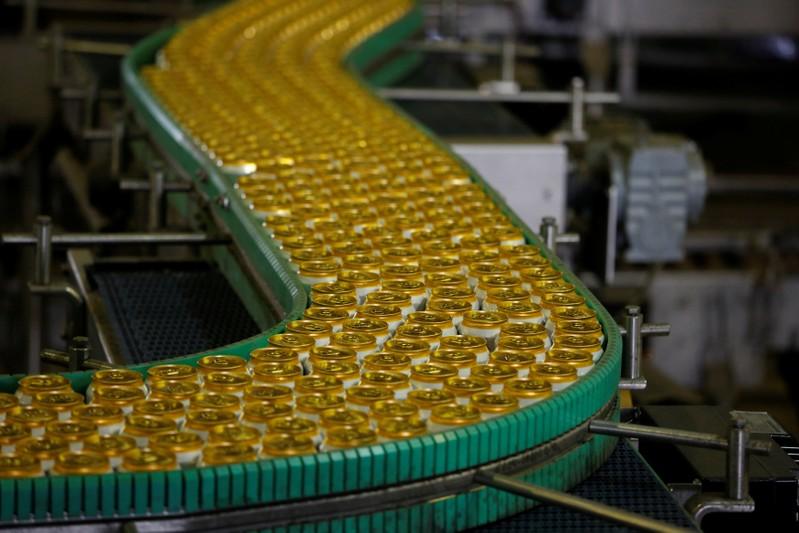Foreign investors and bankers who flocked to Vietnam in the past two decades as they sought to cash in on government plans to sell state assets usually left frustrated as what was promised rarely materialized. But now they are finally seeing some modest grounds for optimism.
In a series of recent moves, the Vietnamese authorities have indicated they may be more serious about significant sales of government-owned companies.
Last month, they unveiled plans to sell a stake of up to 54 percent, worth $5 billion, in the nation’s biggest brewer in what is set to be the country’s largest privatization yet.
Giving up majority control of Sabeco - Saigon Beer Alcohol Beverage Corp is the brewer’s full name - is a bold move in the state.
Hanoi has already changed the rules to speed up future privatizations from next year. Among the changes are the introduction of a book-building process for initial public offerings and an easing of its restrictions on strategic partners.
Vietnam is speeding up its privatization drive as it grapples with a deteriorating fiscal picture, including a budget deficit and growing public debt at a time when it wants to devote more money to developing the nation’s infrastructure.
Private share sales and listings are booming. Mall operator Vincom Retail raised $741 million last month in Vietnam’s biggest equity offering, which attracted cornerstone investors such as Singapore sovereign wealth fund GIC and major U.S. fund manager Franklin Templeton. Total demand for the shares reached $2 billion.
Next year, the government has slated 181 state-owned companies to make divestments of stakes to investors and 64 more for broader share sales through IPOs. Altogether, the government has said it wants to sell stakes in at least 533 companies by 2020 through direct sales or IPOs.
And this doesn’t include dozens of companies who were on the 2017 list but won’t get to market this year. According to the latest publicly available government figures, Vietnam had only managed 26 divestments in the first eight months of this year from a 135-long list that was planned. The 44 IPOs target this year is also likely to be missed, with only 38 IPOs slated to be completed by year-end, a government committee said.
“You have a lot of global asset managers, frontier market investors, hedge funds and others that want to capture and participate in the growth of emerging markets and frontier markets like Vietnam,” said Jeffrey Perlman, Southeast Asia head of Warburg Pincus, which together with a consortium, sold part of its stake in Vincom Retail in the float.
“If you can provide them a conduit with which to do that and a business they can understand, they’ll want to participate,” said Perlman.
Vietnam’s strong economy and roaring stock market underpin its appeal.
Over the past decade, the country has grown by an average 6.1 percent a year, according to World Bank data and Vietnam’s benchmark stock market index .VNI is up 42 percent this year, touching 10-year highs and making it Asia’s best performing market.
And last month, Vinamilk, Vietnam’s largest listed company, bolstered hopes that the privatization process is getting smoother.
A year ago, a planned sale of a 9 percent stake in the dairy group was cut sharply following a last minute rule that limited single bidders to 2.7 percent stakes each.
In November, though, a further share sale attracted 19 bidders and allowed the winner, part of Hong Kong conglomerate Jardine Matheson, to eventually build a 10 percent stake.
 |
| Cans of beer move along a production line at a factory of Saigon Beer Corporation (Sabeco) in Hanoi, Vietnam June 23, 2017. Picture taken June 23, 2017. Photo: Reuters |
Strong stomach needed
Still, the Vietnam market is not for the faint hearted.
Few bankers, investors or lawyers interviewed for this article expect the stop-start process of recent years - characterized by fickle policy making, vested interests and high valuations – to disappear overnight.
As an example, they point to the unorthodox way in which the Sabeco stake is being sold.
In spite of the sale being known about for months, a lack of detail about the size, price or structure until last week means bidders have been given just under three weeks to get their paperwork in order, including arranging deposits and guarantees and setting up onshore accounts.
Unlike the auctions familiar in developed markets, where investors are whittled down over several rounds and offers can be adjusted, Sabeco bidders need to submit a single price for a specific number of shares in a sealed envelope in one round.
“I have never seen a process like this for such a large sale. To bid all or nothing is very weird,” said one banker. “People know this process is crazy. They are trying to solve the puzzle.”
All bids will be ranked only by price, so the highest bidder’s offer will be accepted in full, with remaining shares allocated to the next highest bidders regardless of how many shares they originally bid, the sale documents show.
In theory, for foreigners, the process means a bidder offering the highest price and seeking a 25 percent stake would get that, leaving a rival that offered a price just pennies lower but who wanted the maximum 39 percent, with just 14 percent. Foreigners are restricted to 49 percent total ownership and already hold 10 percent, led by Heineken with 5 percent.
Since listing on the Ho Chi Minh exchange last December, Sabeco’s share price has tripled. Its enterprise value is now 37 times its core profit versus close to 15 for some of the largest global brewers, according to Reuters data.
The stocks rally has left Vietnam as one of the most expensive markets in Asia and dealmakers fear the current optimism could be at risk if prices began slipping.
”The market is frothy. And if it crashes, then everyone just goes on to the next thing. It could change very quickly,’ said Tony Foster, Vietnam managing partner for Freshfields Brukhaus Deringer, who has worked in Hanoi for over two decades.




















































